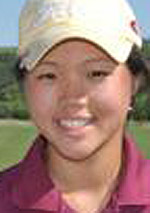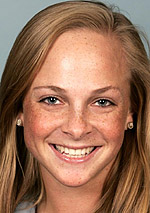Charlotte, N.C. – It’s hardly shocking that a good majority of the field at this week’s U.S. Women’s Amateur is comprised of college golfers.
Most compete at the predominant Division I powers, so it’s not uncommon to see golf bags at Charlotte Country Club with UCLA, the University of Southern California, Georgia, Duke or Purdue written on the side. The University of Virginia and the University of Texas each have five golfers in the field.
But it might surprise many that the University of Pennsylvania is represented by the same number of competitors as perennial power UCLA. There are more Quakers (Isabel Han, Michelle Lee and Meredith Kotowski) in the field than Arizona State Sun Devils (two), USC Trojans (two), Arizona Wildcats (one) or Duke Blue Devils (two).
That’s quite remarkable for the country’s fourth-oldest higher-education institution, which is more renowned for producing Nobel Prize winners and Fortune 500 CEOs than LPGA Tour stars.
It’s pretty exciting, said third-year Penn women’s golf coach Mark Anderson, who last year guided the Quakers to
their first Ivy League title in the program’s history. Penn had never finished better than fifth in previous seasons. To have three girls [at the Women’s Amateur] is just amazing. 

Michelle Lee Meredith Kotowski
I figured if there were three Ivy League girls total that would be amazing.
In fact, the conference that forbids scholarships based on athletic ability has six representatives in the field. Besides the Penn trio, Yale has two (Cassie Boles and Sun Gyoung Park) and Princeton one (Kelly Shon).
The Ivy League is a special community, said the 22-year-old Kotowski, a 2010 Penn graduate from Marion, Mass. [The competition] is getting better every year.
In a way Ivy League golfers are almost an anomaly during an era where virtually every elite player is seeking the quickest path to professional stardom. Many skip college altogether – see Paula Creamer, Alexis Thompson, Brittany Lincicome and Morgan Pressel – or turn pro before completing their eligibility – i.e. Lorena Ochoa, Grace Park, Brittany Lang and Annika Sorenstam.
But for those golfers enrolling at Penn – or any other Ivy League institution for that matter – education is valued as much as a good short game. No athlete survives the vigorous academic requirements without a proper balance between studies and competitions/practice sessions.
It’s all time management, said Han, a 19-year-old rising sophomore who has qualified for four USGA championships. Your professors don’t care that you are an athlete. It’s all up to you. It’s all how you schedule and manage your time.
For me it’s very important to finish college. There are so many great golfers out there, but you can get hurt in an instant. But … as long as you don’t hit your brain, you always have that. So I think it’s a very good backup.
The Real World
Next month, when many elite players will be putting in final preparations for golf’s toughest job interview best known as LPGA Tour Qualifying School, Kotowski will be reporting to a small cubicle at 9 West in Midtown Manhattan. She won’t be measuring yardages to the nearest fairway bunker or figuring out the proper break on a 12-foot putt.
Instead she’ll be working as a human-resource analyst at Apollo Management, a private-equity firm with offices in New York, London, Purchase, N.Y., and Los Angeles. For the past three summers, while many of her fellow golfers were traversing the country and competing in prestigious competitions, Kotowski was grooming herself for life after college by completing internships in Connecticut, Los Angeles and New York.
In fact, she hadn't attempted to qualify for a USGA championship since her junior year in high school. For Kotowski, attending Penn offered the chance to continue playing golf at a competitive level while also offering a challenging curriculum for a non-athletic professional career.
Some professors didn’t even know we had a women’s golf team [at Penn], said Kotowski. It’s rare that you can take an exam on the road. They don’t care if you are an athlete. You are expected to do the work like anybody else.
It was extremely difficult. It was tough to schedule classes. But our coach made it manageable. If we ever needed time to catch up with our studies, you were able to do that.
So when Kotowski, one of three seniors on the 2009-10 team, helped the Quakers win their first Ivy League title this past spring at Baltusrol Golf Club’s Upper Course, it was extremely satisfying.
She’s been a strong contributor to our team the last four years, said Anderson. Meredith hits the ball great. But her putting over the last month or so at Penn was atrocious. She should have finished in the top five at the Ivy League [Championship]. But she had 38, 39, 40 putts [per round].
Using her Penn education, Kotowski solved her woes on the greens by simply applying some lead tape to her putter. Combined with some extra practice, she managed to shoot a 75 in a Women’s Amateur sectional qualifier in Southwick, Mass., to earn one of the available five spots. Call it a nice post-graduation present.
I’m here to have fun, said Kotowski of her first USGA championship experience. It’s my last tournament before I go to my cubicle. Obviously I want to make match play. That’s my goal.
Blazing A New Trail
When Isabel Han was a sophomore at Lake Mary (Fla.) Prep, UCLA expressed some interest in her talent. But by the time she was looking hard at colleges, it came down to Penn, Princeton and Georgetown, three schools with tremendous academic pedigree, but little women’s golf tradition.
Golf was certainly important to Han, a Harrington Park, N.J., native who moved to the warmer confines of Florida to attend high school. But excelling in the classroom also was important to Han.
I was focused on getting an education, said Han, who has LPGA Tour aspirations. I want to graduate from school and then work on that.
Han actually qualified for her first U.S. Women’s Amateur as a high school junior, playing at Crooked Stick in 2007, where she missed the match-play cut. She made the 2008 U.S. Girls’ Junior field at Hartford (Conn.) Golf Club, but again missed the cut for match play. Last year, she qualified for the Women’s Amateur again, only to withdraw prior to the competition with tendinitis in her right wrist.
As a freshman at Penn, she not only handled the demanding class load, but also finished second at the Ivy League Championship by one stroke to Yale junior Alyssa Roland.
Enrolled in the prestigious Wharton School of Business, Han spends her mornings in classes, heads to the course in the afternoon for practice and is back home to study at night.
It’s quite a balancing act, she said. I have no regrets at all. It’s the best experience. Playing on the golf team and going to an Ivy League school, it’s very humbling.
Just A Hobby
It was almost unfathomable hearing the words from an 18-year-old elite golfer.
The NCAA public-relations staff might want to bottle them for its 99 percent of student-athletes will be going pro in something other than sports, add campaigns.
Korean-born Michelle Lee of Toronto, Ontario, Canada definitely enjoys playing competitive golf, but don’t look for her at LPGA Tour Q-School in four years.
If I take it as a profession, I think I would get too stressed with it, said the incoming Penn freshman who is playing in her second USGA championship. She qualified for last year’s U.S. Girls’ Junior at Trump National but missed the match-play cut. I just want to play golf as a hobby and enjoy college golf.
Lee’s dream since moving to Canada with her parents from Seoul nine years ago was to enroll at an Ivy League institution. She looked at Columbia and Princeton before settling on the big-city atmosphere of Penn. Her intention is to major in economics, but she indicated law school could be in her future.
Don’t put anything past Lee. When she arrived in Canada in 2001, she only knew the ABCs. Watching television and being around others, she quickly learned English and now is headed to one of the finest academic universities in the world.
She also understands the sacrifices that lie ahead at Penn.
At other [non-Ivy League schools], I would have an advantage over other students when it comes to registration, said Lee. The Ivy League doesn’t have priority registration. You are responsible for getting all your classes. Those are the sacrifices you have to make to go to a good academic school and I’m willing to make that sacrifice.
David Shefter is a USGA communications staff writer. E-mail him with questions or comments at dshefter@usga.org.
